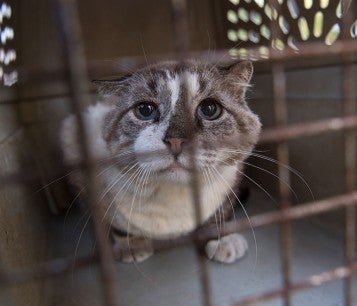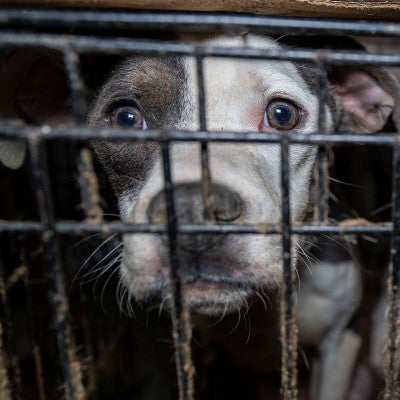Every state has laws prohibiting animal cruelty and all of them contain felony provisions. However, a law is only as good as its enforcement and that's why animals rely on you to protect them by reporting animal abuse.
Defining cruelty
Most reported animal cruelty comes in the form of neglect, with direct violence occurring less. Often times, it can be difficult to gauge whether or not you’ve witnessed animal cruelty—the following examples may help you categorize suspected cruelty you do see.
Neglect
Neglect, or a failure to provide basic needs for an animal, makes up the vast majority of cruelty cases that animal control officers respond to. Neglect often includes hoarding, lack of shelter or veterinary care, tethering and abandonment, as well as other forms of abuse.
Direct abuse
It can be very upsetting to see someone beating or physically attacking an animal, but it's important not to turn away. It's crucial to involve law enforcement quickly, as violence toward animals is often part of a larger pattern of violence that can include people as well.
Reporting abuse
If you witness suspected cruelty to animals, call your local animal control agency as soon as possible or dial 9-1-1 if you’re unfamiliar with local organizations. If you make a report of alleged animal cruelty, the responding agency is required to investigate.
If your area lacks the proper animal welfare agency and your local authorities are not equipped to deal with animal cruelty cases, you can also contact us.
Be sure to document the case as well as you can with dates, times, specific details and, if possible, footage and photographs from a cell phone. All of these things can help appropriate agencies during any investigation they may do of the suspected cruelty.
Hoarding
Hoarding behavior often victimizes animals. Sufferers of a hoarding disorder may impose severe neglect on animals by housing far more than they are able to adequately take care of. Contact your local animal control agency if you find out about animal hoarding. Some animal hoarding situations can be more difficult than others to solve.
Lack of veterinary care
Untreated wounds are a red flag that demand immediate attention; emaciation, scabs and hair loss can also be a sign of untreated diseases. If you can, alert the owner to the animal's condition and alert local authorities of suspected neglect as soon as possible.
Inadequate shelter
In extreme heat or cold, temperatures can be deadly. It can seem daunting or unnecessary to report neglect for inadequate sheltering, but conditions can change quickly, causing suffering or even death of the animal. Contact a local animal control agency immediately if you see an animal in inadequate shelter and document the incident with a cell phone camera if possible.
Abandonment
Animals die every year when people move out of their residences and simply leave the animals behind. Sometimes an abandoned dog's barking or cat's howling can alert the neighbors, but it's wise to keep an eye on a recently vacated home, especially if the former residents moved suddenly. Companion animals kept in cages or tanks are often overlooked upon a resident's sudden passing and may suffer neglect as well. If you find or know of abandoned animals, contact your local animal control agency immediately.
Pets left in cars
Time is of the essence when reporting pets left in parked cars. Even if the outside temperature seems cool, these animals could be minutes away from death or irreversible organ damage. If you cannot locate the owner immediately, don’t be afraid to call local authorities, detailing your location and the make, model and license plate number of the vehicle the animal is inside.
Learn More About Pets in Hot Cars
Beating and physical abuse
If you witness direct physical violence to an animal, report the incident immediately to authorities. If you decide to intervene in any way, use your best judgement and do not become physically involved in the situation; remember, even well-intentioned actions could compromise the process of investigation into suspected abuse.
Animal fighting and organized cruelty
Organized cruelty, such as dogfighting and cockfighting, is illegal in all 50 states and is linked to other criminal activities such as human violence, gambling and drug distribution. If you hear about or witness events like these, immediately report them to the local authorities and the HSUS.
Learn More about Animal Fighting
These are just common examples of animal cruelty. Even if a case doesn’t fit neatly into these categories, take action if something feels off. In many cases, you may be the only chance an animal has at escaping cruelty or neglect.
We never know where disasters will strike or when animals may be in need of urgent rescue, but we know we must be ready. Your support makes this lifesaving work possible.

Our work
What role does the HSUS play in local animal abuse and neglect cases?
We're fighting to:
- Promote public education.
- Advise local agencies and provide monetary grants to assist in specific local cases.
- Direct intervention and rescue in large-scale cruelty cases.
- Conduct regular investigations into institutionalized cruelty within agribusiness.
- Lobby to strengthen animal protection laws.
- Offer rewards for information leading to an animal cruelty or animal fighting conviction.
With each case the HSUS initiates, we assist not only in the rescue, handling and rehoming of animals, but also in the subsequent prosecution of each case.
Training for law enforcement
The HSUS also provides specialized training, assistance and resources to animal welfare agencies, law enforcement and prosecutors around the country on issues involving animal cruelty and animal fighting. We provide educational materials, online courses, operations guidelines and other expertise.

